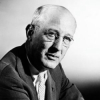Bruce Catton

Bruce Catton
Charles Bruce Cattonwas an American historian and journalist, best known for his books on the American Civil War. Known as a narrative historian, Catton specialized in popular history, featuring colorful characters and historical vignettes, in addition to the basic facts, dates, and analyses. Although his books were well researched and supported by footnotes, they were not generally presented in a rigorous academic style. He won a Pulitzer Prize in 1954 for A Stillness at Appomattox, his study of the final...
NationalityAmerican
ProfessionHistorian
Date of Birth9 October 1899
CityPetoskey, MI
CountryUnited States of America
I think I was always subconsciously driven by an attempt to restate that faith and to show where it was properly grounded, how it grew out of what a great many young men on both sides felt and believed and were brave enough to do
Beneath everything else, North and West, there ran a profound, unvoiced, almost subconscious conviction that the [American] nation was going to go on growing-in size, in power, in everything a man could think of-and in that belief there was a might and a fury that would take form instantly at the moment of shock.
Nathan Bedford Forrest ... used his horsemen as a modern general would use motorized infantry. He liked horses because he liked fast movement, and his mounted men could get from here to there much faster than any infantry could; but when they reached the field they usually tied their horses to trees and fought on foot, and they were as good as the very best infantry. Not for nothing did Forrest say the essence of strategy was to git thar fust with the most men.
Men see things late, and it may be that at times an evil fate drives them on.
It began with one act of madness, and it ended with another. John Brown heard history's clock strike in the night and tried to hurry dawn along with gunfire; now John Wilkes Booth heard the clock strike, and he tried with gunfire to restore the darkness. Each man stood outside the human community, directed by voices the sane do not hear, and each kept history from going logically... The line from Harper's Ferry to Ford's Theater is a red thread binding the immense disorder of the Civil War into an irrational sort of coherence.
A singular fact about modern war is that it takes charge. Once begun it has to be carried to its conclusion, and carrying it there sets in motion events that may be beyond men's control. Doing what has to be done to win, men perform acts that alter the very soil in which society's roots are nourished.
The Civil War was fought in 10,000 places, from Valverde, New Mexico, and Tullahoma, Tennessee, to St. Albans, Vermont, and Fernandina on the Florida coast. More than 3 million Americans fought in it, and over 600,000 men, 2 percent of the population, died in it.
Say this for big league baseball - it is beyond any question the greatest conversation piece ever invented in America.
Early youth is a baffling time
In this respect early youth is exactly like old age; it is a time of waiting for a big trip to an unknown destination. The chief difference is that youth waits for the morning limited and age waits for the night train
Soldiers who had been in the army long enough to know what a bloody swindle war really is would begin to feel that army life was really kind of fun, as long as [General Philip] Sheridan was up front.
The present moment is nice but it does not last. Living in it is like waiting in a junction town for the morning limited; the junction may be interesting but some day you will have to leave it and you do not know where the limited will take you.
Here was the greatest and most moving chapter in American history, a blending of meanness and greatness, an ending and a beginning. It came out of what men were, but it did not go as men had planned.
Our American heritage is greater than any one of us. It can express itself in very homely truths; in the end it can lift up our eyes beyond the glow in the sunset skies.